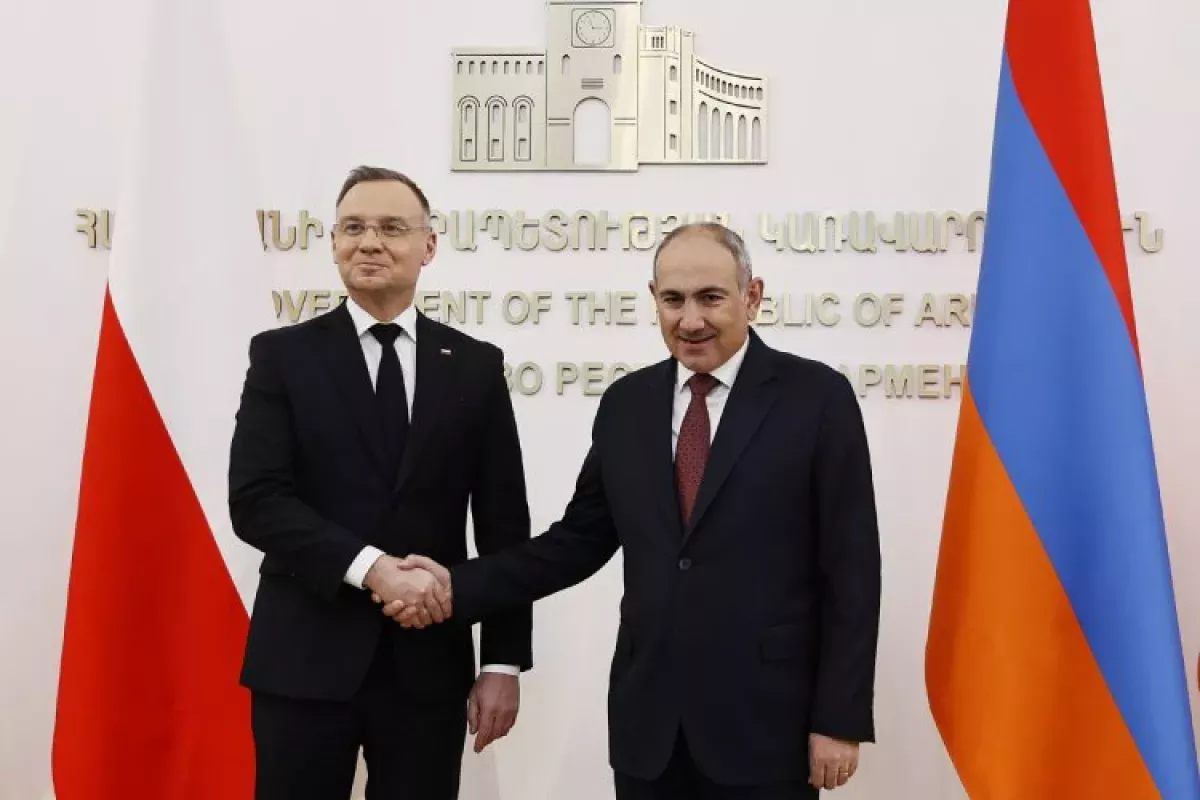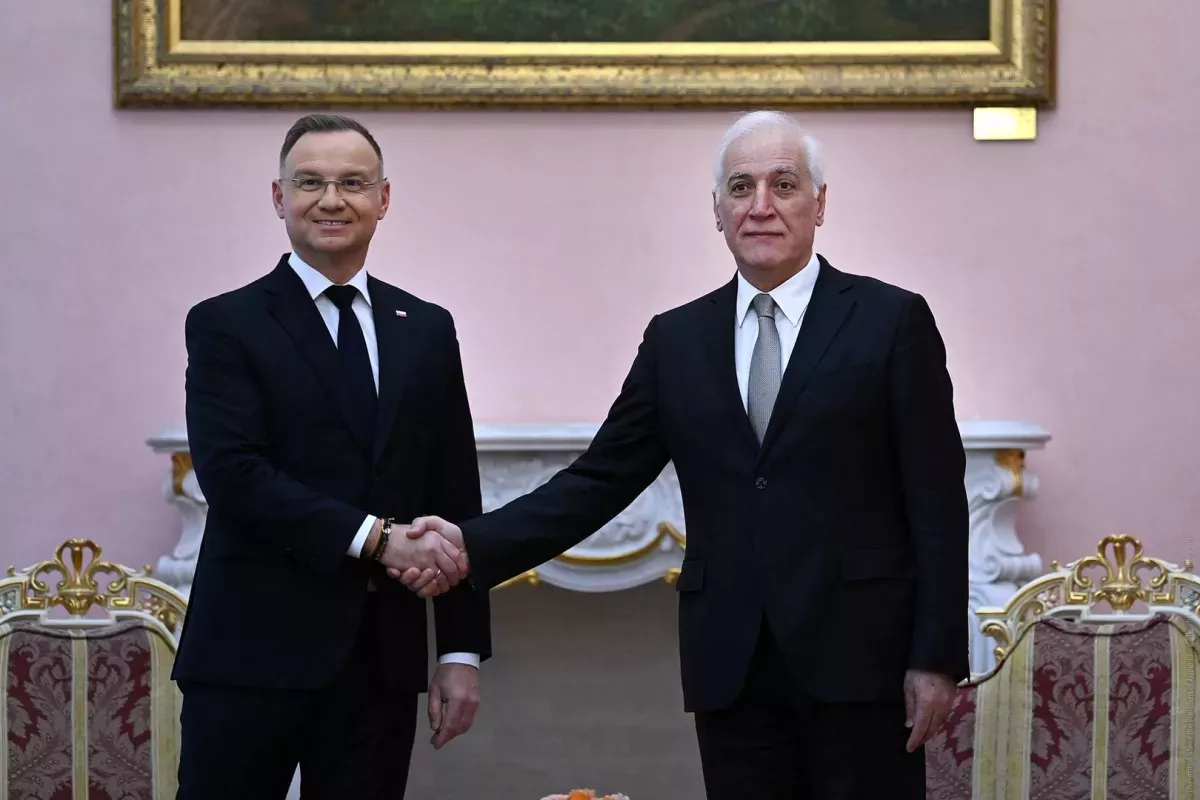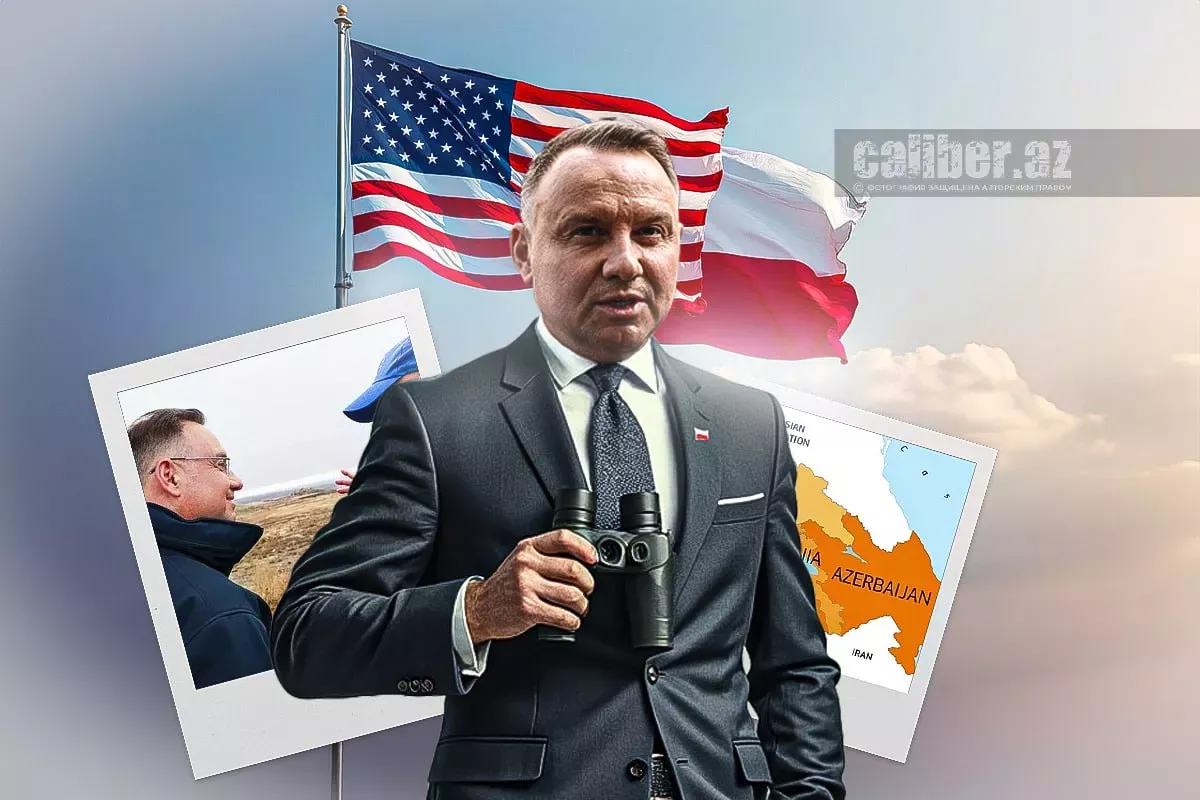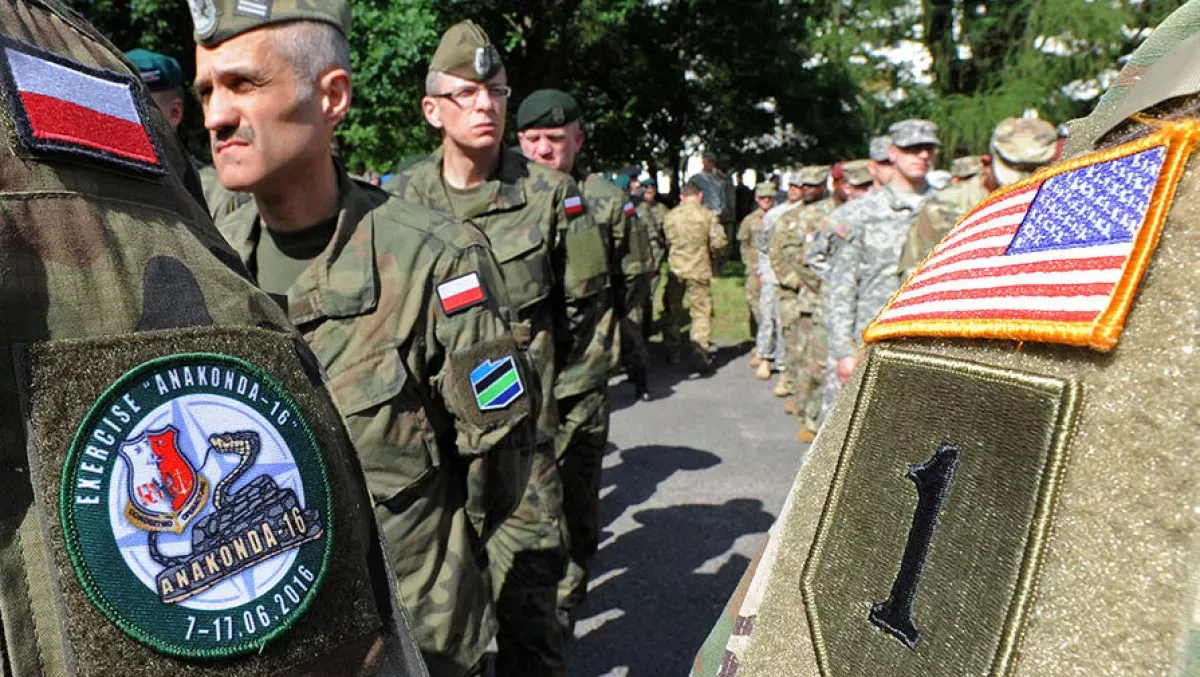Polish experiment with Armenian revanchism Duda’s visit and EU military plans
On November 25-27, the President of Poland, Andrzej Duda, visited Armenia, attempting to speak on behalf of the European Union. During this visit, Duda made several notable statements. For example, he promised the Armenians to strengthen the EU's semi-military mission on the border with Azerbaijan, discussed military cooperation, and explored ways to halt Pashinyan's business of bypassing anti-Russian sanctions.
The Warsaw establishment has grand plans — to become the vanguard of the EU's foreign policy expansion and a key European partner for the United States in NATO. However, for this to happen, Poland will need EU resources, and they are rapidly dwindling.
Historical manipulations
Duda's visit began not with the usual grandiose phrases, but with a digression into the 13th century. In fact, life shows that if someone starts talking about something historical in a pompous manner, be on guard — cynical politics or business is about to begin. And most likely, the history itself will be dubious.
This is exactly what happened here: as soon as Duda started talking about history, every sentence he uttered became, to put it mildly, controversial. He claimed that Armenians have been present in Poland since the 13th century, but he failed to clarify which Armenians he was referring to. To be clear, he was speaking about the Armenian-Kipchaks who lived in the territory of the Polish-Lithuanian Commonwealth (which also included modern Ukraine), and whom Armenian nationalists describe as Armenians allegedly assimilated into the Turkic world. However, there are just as many reasons to view them as a Turkic-origin people who originally lived in Crimea and the surrounding regions, adopted Gregorian Christianity, and later interacted closely with fellow believers. For example, they are credited with building the cathedral in Lviv, which is now known simply as the Armenian Cathedral.
Furthermore, Duda lavished compliments on Armenia, calling it the first "truly Christian country," and stating that "without a doubt, Armenia's contribution to the development of European civilization is enormous." It would be interesting to hear more details — what exactly was Armenia's contribution to European civilization? In the medieval period, Armenians spent many centuries developing within Turkic states — even in Iran, they thrived most under the Azerbaijani Safavid shahs. In fact, it was this symbiosis that allowed Armenian diasporas to prosper, even beyond the region, serving as intermediaries in trade and diplomacy in Europe. Upon arriving in the Polish-Lithuanian Commonwealth, Armenians set up the production of "Persian belts" — there was business, but where was the contribution to European civilization?

Of course, Duda's statements were a smokescreen for presenting his true agenda — geopolitical projects. In his "historical digressions," the Polish president skillfully introduced the announcement of the upcoming revival of the so-called "Eastern Partnership" program, which had previously failed due to the insincerity of its initiators. Instead of fostering constructive cooperation, they used it to destabilize political regimes and pressure Russia.
This focus on the failed "Eastern Partnership" plan is not surprising, given that Poland's new foreign minister is the radical Euro-Atlanticist Radosław Sikorski, the original author of the "Eastern Partnership." President Duda belongs to the party that lost the election a year ago, but his actions align perfectly with the course of the coalition that won the election. In fact, as we can see, he is promoting the "Eastern Partnership" conceived by a representative of that very coalition.
It is important to remember that the "Eastern Partnership" was initially interpreted by Western media in the late 2000s as a Polish tool to exert pressure on Russia. The idea of reviving it, in the context of official preparations for war with Russia, does not seem so outlandish, especially when we consider that Sikorski himself proposed the program right after his tenure as defence minister, once he moved to the Ministry of Foreign Affairs. In other words, it can be seen as a result of his involvement in military planning. In any case, the announcement of the revival of the "Eastern Partnership" in Yerevan appears to be a significant geopolitical move. Unfortunately, it is being driven by external players in relation to the South Caucasus, treating the region as an object of influence and a potential battleground, rather than as a partner in transparent and inclusive cooperation that is not aimed at redrawing spheres of influence.
Pashinyan's borderless business
The matter did not stop with these geopolitical declarations; they were followed by eloquent and concrete actions. Let's set aside the usual verbal embellishments — such as the discussions on some economic cooperation (given Armenia's lack of industry, markets, and infrastructure) and even assistance in transitioning Armenia from the "Soviet system" — what "Soviet" elements remain in Armenia nearly four decades after the collapse of the USSR? This is all demagoguery. Let's focus on some facts. President Duda visited Armenian financial institutions — the Armenian Stock Exchange, the Central Depository, and the AMX Group. Notably, a "closed discussion with a limited number of participants" took place at AMX, during which the parties discussed new opportunities for developing Armenia's financial infrastructure.
At present, Pashinyan's government and Armenian businesses are making enormous profits by bypassing Western anti-Russian sanctions. A crucial role in this is played by Armenia's financial infrastructure. It is this infrastructure, rather than the physical movement of goods, that drives Pashinyan's economic boom. Last weekend, the Russian ambassador to Armenia, Sergey Kopyrkin, revealed: "In the first half of 2024, trade turnover between Russia and Armenia surpassed $8.3 billion, exceeding last year's total of $7.4 billion. We expect to maintain this pace and reach a record $14-16 billion."
Poland, betting on escalation in Eastern Europe and expansion along the entire perimeter of Russia's borders in Europe, would be more than happy to disrupt the communication routes between Russia and the outside world. However, it is hesitant to openly accuse Armenia — this cautiousness is notable against the backdrop of Poland's other bold moves. Instead, Polish elites and media praise the Armenian authorities and lament the alleged "mortal enemy of Armenians — Azerbaijan."
Let's leave aside this propaganda of interethnic division and Armenian nationalism for their conscience, and simply remind ourselves that this is not about facts or principles. If Warsaw and Brussels truly cared about a country's involvement in helping Russia bypass sanctions, the situation would be crystal clear. Against the backdrop of the multi-billion-dollar, unexplained trade between Russia and Armenia, even European commissioners recently officially acknowledged that, despite recent accusations from a British official analytical centre, Azerbaijan does not re-export Russian gas to the EU.
However, such accusations are not seriously made against the Armenian government. Nevertheless, the Polish president explained that Armenians are "culturally their own." One must understand — it's acceptable for them? Moreover, during the final press conference, he stated: "This Russian influence here, in this part of Europe, is something natural."
Khachaturyan: Security cooperation with the EU
In addition to discussions on how to economically strangle Russia, the Armenian authorities also discussed military matters with their Polish guests. Armenia's President Vahagn Khachaturyan, at the first event with Duda, outlined the notable successes in Armenia's relations with the EU, with Poland’s involvement this year: the beginning of negotiations on visa liberalization and the launch of mechanisms within the European Peace Facility. As is well-known, the EU uses this fund for off-budget military spending, and Yerevan, with Paris's help, is trying to leverage it for rearmament at the EU's expense.

Khachaturyan spoke quite openly about perhaps the main issue in exchange for which the Armenian authorities might agree to participate in the economic strangulation of Russia: "We want to discuss security issues with the EU as well. In this context, we see our work with the EU in 2025, including during Poland’s presidency of the EU Council. We have always felt Poland’s support for these initiatives." To translate from diplomatic language — Yerevan seeks to rearm with the help of the EU and, if possible, gain diplomatic and military assistance from the West.
The Polish side confirms the discussion of "security issues" in the region and beyond. Additionally, on November 27, Duda participated in "joint patrols of the Armenian-Azerbaijani border" alongside observers from the EU's EUMA (European Union Monitoring Mission) spy mission. The Polish president made the decision to visit the EU mission while the question of extending its mandate was still under discussion (which Brussels later extended for two years), highlighting Poland's desire to maintain the mission. Furthermore, Duda expressed a wish to increase the number of Polish representatives in the mission. The Polish government has long placed its bets on this mission, and this reflects a strategic goal — to gain a foothold in the South Caucasus by any means. Such extravagant behaviour by the Polish president, deciding to "play border guard" at a conditional border, could not go unnoticed, prompting a response from Azerbaijan’s Ministry of Foreign Affairs, which immediately summoned the Polish chargé d'affaires.

Poland is trying to systematically work on regions bordering Russia, especially in the European part of the Russian Federation. Interestingly, the EU Ambassador to Georgia is also a Polish representative, Paweł Herczyński, who openly supports attempts at a Maidan-style movement. On November 28-29, he even made a provocative statement, claiming that the Georgian leadership was halting the process of European integration, when in reality, the Georgians were talking about suspending public discussions for three years while simultaneously continuing the previously planned cooperation with the EU in order to calm tensions.
Poland strengthens its position in the EU-NATO, but for how long?
In conclusion, it should be noted that Poland's actions in the South Caucasus were based on several common trends. First, despite the change in government in Warsaw a year ago, Poland not only maintained its previous political course, which challenged Brussels, but also managed to become a leader of the growing group of countries that disregard the directives of EU structures. Furthermore, Polish elites have long worked on building their own separate alliance with the United States, in addition to the multilateral alliance within NATO. They have strong ties with Washington — in recent years, Poland has achieved significant success in becoming the main American ally in NATO on the European continent, purchasing vast amounts of weaponry and hosting American troops and a strategic missile base on its territory. This is what is called Eastern European-style sovereignty. Next year, Warsaw will allocate the largest percentage of GDP for military spending among all NATO countries — 4.7%! This means that new billions will go toward contracts for American companies. The Poles hope to thus establish better relations with Washington than the miscalculated and anti-Trump liberal EU leadership.

All of this has led to the growth of Warsaw's influence in the EU and the promotion of the Polish agenda within the European Union. Brussels, which had long criticized Warsaw for deviating from the liberal agenda, now has to "catch up" — as seen in the tightening of migration policies and the demands of the reappointed President of the European Commission, Ursula von der Leyen, to increase military spending of EU countries more than fourfold to the level of Russia (which she believes is 9% of GDP) and to focus on competition and confrontation with Russia and China in all areas.
Moreover, the posts of EU commissioners for foreign policy and defence have been filled by representatives of Estonia and Lithuania, Poland's closest allies, who share Warsaw's radically anti-Russian agenda. Given their influence within the EU, this, especially the appointment of the Lithuanian candidate, could hardly have happened without Polish support, as Lithuania, more than any other EU country, closely coordinates its policy with Poland. In other words, Poland has secured its allies in key EU institutions.
Perhaps the Pashinyan team views all these developments with optimism. However, it is worth pointing out a couple of nuances that change the whole picture. First, both Poland and its key allies are able to pursue their current policies thanks to the funds they receive from the EU. But EU funds are running out, primarily because the key German economy is in decline — in the past week, it was reported that about a hundred thousand workers have been laid off from some of Germany's most well-known industrial companies, and work hours have been reduced. This will have an impact on the entire EU-NATO bloc: on November 29, it was announced that there would be large-scale layoffs at EU representations in non-Western countries. The European External Action Service has exceeded its budget for this year, and next year, due to rising costs and inflation, the situation could worsen. However, it has been decided to "reinforce staffing in countries where the EU believes the bloc has strategic interests."
The second nuance is the global plans of Trump, who is unlikely to heed the suggestions of Polish partners regarding confrontation with Russia, especially in the South Caucasus. President Duda became infamous for his photo, in which he smiles submissively at President Trump, who is lounging at a table during the signing of documents about the permanent stationing of US troops in Poland. So, it will be Trump who sends the Poles, Armenians, and others to fight China, Iran, or North Korea, rather than the Poles convincing Trump to go to war with Russia.
This situation is reminiscent of the old story from the 18th century, when the Polish nobility, having lost their Eastern European empire, attempted to restore it with the help of Emperor Napoleon. To do this, they even found a Polish mistress for Napoleon. But it didn’t work out; instead, he used the Poles for punitive missions and cannon fodder, sending them to crush the slave rebellion in Haiti and the partisan movement in Spain. In the end, however, Napoleon did march on Russia a decade later, but for his own reasons, and the Polish elites were left with nothing once again.








